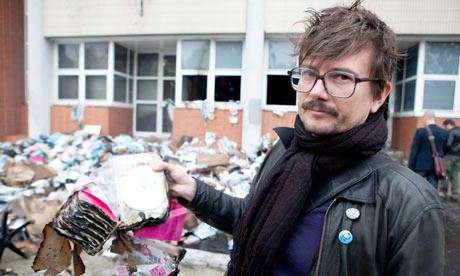The White House on Charlie Hebdo, Then and Now

The White House has released a statement from President Barack Obama about this morning's attack and murder of 12 people at French satirical magazine Charlie Hebdo in Paris over its use of depictions of Mohammad in its images. It's short and to the point:
I strongly condemn the horrific shooting at the offices of Charlie Hebdo magazine in Paris that has reportedly killed 12 people. Our thoughts and prayers are with the victims of this terrorist attack and the people of France at this difficult time. France is America's oldest ally, and has stood shoulder to shoulder with the United States in the fight against terrorists who threaten our shared security and the world. Time and again, the French people have stood up for the universal values that generations of our people have defended. France, and the great city of Paris where this outrageous attack took place, offer the world a timeless example that will endure well beyond the hateful vision of these killers. We are in touch with French officials and I have directed my Administration to provide any assistance needed to help bring these terrorists to justice.
Nothing particularly outrageous about the response, but there is a notable lack of defense of free speech and free expression beyond an extremely vague gesture at "universal values." It's a statement that murdering people is bad and freedom is good.
This isn't the first time Charlie Hebdo has been attacked over its depictions of Mohammad. In 2011, the weekly newspaper was firebombed over previous jokes targeting Islam. Then in 2012 it was in the news again as more representations of Muhammad stirred up more fears. It came up at a White House press briefing and here's then Press Secretary Jay Carney's response:
Q The French government has decided to temporarily close their embassies and schools in several Muslim countries after a satirical weekly, Charlie Hebdo, that published cartoons mocking the Prophet Muhammad. Is the White House concerned that those cartoons might further fan the flames in the region?
MR. CARNEY: Well, we are aware that a French magazine published cartoons featuring a figure resembling the Prophet Muhammad, and obviously, we have questions about the judgment of publishing something like this. We know that these images will be deeply offensive to many and have the potential to be inflammatory. But we've spoken repeatedly about the importance of upholding the freedom of expression that is enshrined in our Constitution.
In other words, we don't question the right of something like this to be published; we just question the judgment behind the decision to publish it. And I think that that's our view about the video that was produced in this country and has caused so much offense in the Muslim world.
Now, it has to be said, and I'll say it again, that no matter how offensive something like this is, it is not in any way justification for violence -- not in any way justification for violence. Now, we have been staying in close touch with the French government as well as other governments around the world, and we appreciate the statements of support by French government officials over the past week, denouncing the violence against Americans and our diplomatic missions overseas.
Some media outlets are noting today that the White House was critical of Charlie Hebdo back then. That's true, but at least the administration did state the value of upholding freedom of expression. There's actually nothing about freedom of speech in the president's current response.
Secretary of State John Kerry did better in public comments, though I think many would take issue with his claim that France "gave birth to Democracy herself." He said that extremists fear the most France's freedom and free expression: "Free expression and a free press are core values; they are universal values, principles that can be attacked but never eradicated, because brave and decent people around the world will never give in to the intimidation and terror that those seeking to destroy those values deploy." It always amazes me how, even when the Obama Administration promotes individual freedom and liberty, they manage to make a statement of collective "universal values." If freedom of speech and expression were truly universal values, then we wouldn't need the First Amendment to protect Americans from government censorship. We certainly wish they were universal values, but they're obviously not.


Show Comments (244)